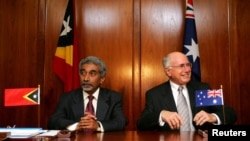SYDNEY —
East Timor has accused Australia of violating its sovereignty by spying on its impoverished Asian neighbor during negotiations for an oil and gas treaty in a battle over natural resources. The case is now being heard at the International Court of Justice in The Hague.
East Timor alleges that spies were used to give Australia an unfair advantage during negotiations over oil and gas revenue a decade ago. The 2006 treaty divides the Greater Sunrise field between the two countries. In East Timor, there has been a feeling that the agreement unfairly benefits Australia at the expense of its poorer neighbor.
The East Timor government wants the accord scrapped. It has also demanded at the International Court of Justice at The Hague the return of documents and data connected to the case that were seized in raids by Australian agents on the Canberra home of a lawyer representing East Timor last year.
East Timor’s Ambassador to Britain, Joaquim da Fonseca, told the court the agents took important and privileged communications during the raid.
"In complete disregard and disrespect of our sovereignty Australian secret agents have seized papers relating to the arbitration proceedings as well as other important legal matters between Timor-Leste [East Timor] and Australia,” said da Fonseca in his testimony.
Australian authorities said the raid was necessary, and insisted that the lawyer, who is a former Australian spy, was about to give classified documents to a foreign power.
The Australian government has told the court in the Netherlands that the material would only be used to protect national security, and not for commercial gain.
Ben Saul, a professor of international law at the University of Sydney, said the case threatens to derail bilateral relations.
“The Timorese, of course, were pretty upset by allegations that Australia had bugged its negotiators during the oil and gas treaty negotiations some years ago, and, of course, that does paint Australia in a pretty dim light. I mean [East] Timor was a really poor, struggling country, Australia is one of the wealthiest countries on the planet and here we are trying to get an unfair advantage [in] negotiations that were really central to the economic future of Timor,” said Saul.
Judgment in the case is not expected for several weeks. It comes as Australia’s relations with another near neighbor continue to deteriorate.
Canberra acknowledged earlier this month that its navy breached Indonesian territorial sovereignty as part of its controversial policy to stop boats carrying asylum seekers. Immigration Minister Scott Morrison said the incursions were “inadvertent,” and that the policy of towing asylum vessels away from Australian waters would continue. Indonesia’s foreign minister this week called the policy “unhelpful” to bilateral relations.
East Timor alleges that spies were used to give Australia an unfair advantage during negotiations over oil and gas revenue a decade ago. The 2006 treaty divides the Greater Sunrise field between the two countries. In East Timor, there has been a feeling that the agreement unfairly benefits Australia at the expense of its poorer neighbor.
The East Timor government wants the accord scrapped. It has also demanded at the International Court of Justice at The Hague the return of documents and data connected to the case that were seized in raids by Australian agents on the Canberra home of a lawyer representing East Timor last year.
East Timor’s Ambassador to Britain, Joaquim da Fonseca, told the court the agents took important and privileged communications during the raid.
"In complete disregard and disrespect of our sovereignty Australian secret agents have seized papers relating to the arbitration proceedings as well as other important legal matters between Timor-Leste [East Timor] and Australia,” said da Fonseca in his testimony.
Australian authorities said the raid was necessary, and insisted that the lawyer, who is a former Australian spy, was about to give classified documents to a foreign power.
The Australian government has told the court in the Netherlands that the material would only be used to protect national security, and not for commercial gain.
Ben Saul, a professor of international law at the University of Sydney, said the case threatens to derail bilateral relations.
“The Timorese, of course, were pretty upset by allegations that Australia had bugged its negotiators during the oil and gas treaty negotiations some years ago, and, of course, that does paint Australia in a pretty dim light. I mean [East] Timor was a really poor, struggling country, Australia is one of the wealthiest countries on the planet and here we are trying to get an unfair advantage [in] negotiations that were really central to the economic future of Timor,” said Saul.
Judgment in the case is not expected for several weeks. It comes as Australia’s relations with another near neighbor continue to deteriorate.
Canberra acknowledged earlier this month that its navy breached Indonesian territorial sovereignty as part of its controversial policy to stop boats carrying asylum seekers. Immigration Minister Scott Morrison said the incursions were “inadvertent,” and that the policy of towing asylum vessels away from Australian waters would continue. Indonesia’s foreign minister this week called the policy “unhelpful” to bilateral relations.










